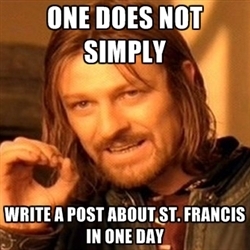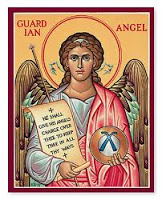John Janaro's Blog, page 311
October 11, 2012
Who Needs to be Newly Evangelized? ME!!!
 The Year of Faith has begun. It will provide many opportunities for us to pray, study our faith, and consider the possibilities of the New Evangelization. What I hope and pray for in this year is that each of us, starting with myself, might discover Jesus Christ anew and belong to Him more fully. For is there anyone among us who is not utterly poor in front of Him?
The Year of Faith has begun. It will provide many opportunities for us to pray, study our faith, and consider the possibilities of the New Evangelization. What I hope and pray for in this year is that each of us, starting with myself, might discover Jesus Christ anew and belong to Him more fully. For is there anyone among us who is not utterly poor in front of Him? We can always grow in our adherence to Him, and our allowing of our hearts to be more deeply healed and penetrated by His love for us. The faith we have been given, and that we want to share, is nothing less than the event "of encountering Jesus as a living Person, of letting ourselves be totally involved by Him and by His Gospel" (Benedict XVI).
The New Evangelization must be this, or else it is just more clanging cymbals. Every human person has been created to encounter Jesus Christ, and to be transformed by His mercy. And my awareness of this is real only if it is fundamentally an awareness of my own need as a person.
First of all, I need to be newly evangelized. Every moment of every day, I need Christ.
*Jesus, I pray, open the depths of my self so that I might let You love me more!*
Jesus stood up and proclaimed, "If any one thirst, let him come to me and drink. He who believes in me, as the scripture has said, 'Out of his heart shall flow rivers of living water.'" (John 7:37-38)
Published on October 11, 2012 20:01
October 9, 2012
Time: An Education in the Love of God
 ALMOST THREE O'CLOCK (picture courtesy of
ALMOST THREE O'CLOCK (picture courtesy ofhttp://www.picture-newsletter.com/clocks/index.htm)"Time is a gift."
That's what they tell us, anyway.
It usually seems like something else. We presume upon it. We take it "for granted." Or else, we feel like we don't have enough of it. We're afraid of losing it. On the other hand, it can seem to stretch out before us like an endless dry desert, or burden us like a terrible weight.
Its hard to say anything good about time that doesn't sound cliche. Of course, many things sound cliche to us because we go around repeating them without trying to understand what they really mean.
Human things take time.
Even that apex of human existing--the free decision--that instantaneous flash of spiritual vitality, usually occurs within a context of time, as the fruit of deliberation, the process of formation that shapes our way of perceiving goodness, and the cultivation of good (or bad) inclinations.
Time signifies the "becoming" of things, and especially the becoming of human persons. We are not born in a state of complete realization. We are born with the vocation to become the persons that God, in His wisdom and love, wills us to be. Time is given to us for the discovery and the fulfillment of that vocation, for the learning and the carrying out of God's plan for me.
Time is necessary for that unique human endeavor and experience that we call education.
But we never learn the whole of God's plan, even as we struggle to cooperate with it and, often, endure it in its many incomprehensible aspects. The "map" of human nature only sketches some parts of the journey, and shows us the boundaries of the road.
This is because the person that is "you" and the person that is "me" are called to a supernatural vocation--we are called to transcend "human nature" as we can conceive it, and become sons and daughters of God. And we are born into a human family that bears the mark of this vocation and at the same time the strange alienation and incapacity to attain it. Yet it is this vocation that corresponds to the very depths of what it means for "me" to be "myself."
And so the Word became flesh. In his humanity the Son used time, to dwell among us, to educate us, and above all to love us with that transforming love that expresses and communicates God's plan for each and all of us. Jesus on the Cross conquers our alienation and separation from God, and makes it possible for each of us to become children of God, which is the real destiny that corresponds to our vocation--the path upon which God continually draws our hearts.
Thus the ultimate answer to the question, "Who am I?" is inseparable from an event that took place in time (but that is not limited by time). My person and my life are defined at every moment by the redeeming and transforming love of Jesus Christ. This is the truth for every person, and it is the great mystery that is woven into God's plan for each of us--the plan that unfolds in the time we are given.
Time is the realm of faith. Time is where we are educated to trust in God, to lose ourselves in order to find Him, and to find ourselves in Him.
Who am I? What gives my life value? What shapes my personal vocation, and places before me the steps I take? What is the meaning of my life, of this present moment? What is the real, concrete foundation of my unshakable dignity as a human person? It is this: Jesus Christ loves me.
"I have been crucified with Christ; it is no longer I who live, but Christ who lives in me; and the life I now live in the flesh I live by faith in the Son of God, who loved me and gave himself for me" (Galatians 2:20).
Published on October 09, 2012 08:42
October 8, 2012
Homecoming and Friendship

This weekend's annual Homecoming at our college drew me to the post I wrote for last year's Homecoming. I was then prompted to reflect and develop further these (still very incomplete) thoughts about friendship. On a certain level, the things I said last year are a precise "fit" for this past weekend. But my reflections have continued to grow, and so here is a revised post of considerations that are still in progress:
I had some nice visits this weekend with some long-time friends (notice I didn’t say “old” friends). Some were people I had not seen or heard from for many years. Others were people I had not seen for a long time, but whom I have been in touch with in varying degrees through one or more kinds of media. Still others were people I have seen (and keep in touch with) frequently over the past thirty (or more) years
And then, finally, there were the people I see all the time, and who help me in my own life. Especially with them, the pace of daily events often crowds out the simple possibility of "visiting" one another. This is something we hardly realize until some celebration comes along that brings us together gratuitously. This is one of the great values of a celebration.
It is a blessing to be with friends. I marvel with gratitude that my life has been endowed with such real, substantial, and long-lasting friendships. I realize after nearly half a century of life that this is not a common experience in our culture.
But what makes these friendships real? What makes any friendship real? I have found that there are two kinds of enduring friendships, and although both presuppose time spent together, both are based ultimately on something that transcends (even as it enters into) time and space. That “something” is truth.
The first kind of enduring friendship is one that is based on a common search for the truth. These friends may not share the same faith, and may have other disagreements over matters of importance. But they have traveled the road of life together in some way, and have ardently engaged together in seeking the purpose and significance of things.
In these friendships there is a real recognition of “truth,” even if the term is not used, because what unites these friends is their awareness of a common desire for something real, for something that lasts and gives meaning to the events of time and the story of life. It can be a something that is hinted at and reflected through very ordinary experiences that people share, or even in the intuition that corresponds to the harmony they discover with each other through shared interests or sympathy of temperament and perspective.
But for friendship to endure, it is not enough to have “things in common,” or to simply “get along;” there is the enduring theme of a great destination, toward which friends journey–perhaps in the dark, perhaps without knowing the way, perhaps in continual argument over what exactly the destination is, or perhaps simply with the quiet, implicit recognition that it is there and that it draws them onward.
The second kind of enduring friendship is in many ways like the first, but it has another aspect. It is a common journey toward the fulfillment of the truth that has already been encountered. Such friends are often brought together by some particular event or experience they have shared. They have had an encounter with persons and circumstances that seem quite ordinary in themselves, and that might be spread out over a significant period of time. But this apparently ordinary history of place and time and circumstances carries within it the experience of something extraordinary and utterly convincing.
These friends have experienced together something that defines the rest of their lives and that they will never be able to deny without denying themselves. And one often finds that they will be the most odd and unusual sort of companions. One is struck by a great variety of temperaments and preferences, backgrounds, inclinations, and tastes. What binds them together as friends, however, and keeps them together through the years and even through divergent circumstances is this common experience.
And it is not just any experience. It is an encounter with nothing less than the Mystery that gives meaning to all of life, the Mystery that has entered their world and placed them together on a common road. At a certain point in time the truth brought them together, they recognized the truth, they tasted it, they said to one another, “Here is the reason why we live,” they met the truth and were regenerated by it.
Sometimes we forget where we come from. But when we meet our brothers and sisters again, we remember whose children we are, and the home that we are all seeking together. We help each other simply by seeing the different ways in which this awareness has shaped each of us thus far, We recognize--in the various ways that our personalities are maturing, and also in our struggles and failures--the Reality that we still have and still seek in common, even if we haven't seen each other in a long time.
And, of course, we can become great friends with others who have found this same truth under different concrete circumstances, whom we meet further down the road.
All this, however, raises another question: When I encounter the truth of my life, does that mean I can no longer have the "first kind" of friendship? Does it mean that I ought to look down upon those who are still searching, with pity and a sense of superiority? Not at all. Quite the contrary!
The truth of my life is not an abstract theory, which I can master by learning its terms and its logic. The truth of life is a Person. He has not come into my life to end my journey, but to show me where I'm going, to draw me to Him, and to shed light on everything along the way.
This means that my friendship with those who are still seeking the truth can only become more profound. The relationship with Him who is the truth of life can only deepen my appreciation and reverence for every person, and my desire to be their companion. I recognize that I myself am part of the experience of that person's life, through which the Mystery-who-dwells-among-us invites and draws their freedom.
Those of us who know Jesus Christ cannot simply live like a club, or a partisan group that controls truth and that preaches down at others. We are called to stay together as brothers and sisters, but also to dwell with others and share their lives and their sufferings and their searching. He who is "the truth" has us. He is changing us, and He wants us to be living witnesses within the journey of others...with the right words in their proper time, but above all with the love that He generates and shapes according to His particular plan for each person.
Published on October 08, 2012 06:27
October 6, 2012
What's "New" About The New Evangelization?
 Artificial lights conceal the gathering storm....
Artificial lights conceal the gathering storm....
The Synod of Bishops on the New Evangelization begins this coming week. It is worthwhile to recall the words of Benedict XVI when he established the special Congregation for the New Evangelization last year. Among other things, Benedict has a special concern for the need to bring the Gospel in a new way to Western culture that has become alienated from the faith that shaped its past:
The term, “new evangelization” recalls the need for a renewed manner of proclamation, especially for those who live in a context, like the one today, in which the development of secularization has had a heavy impact, even in traditionally Christian countries.
The Gospel is the ever new proclamation of the salvation worked by Christ which makes humanity participate in the mystery of God and in his life of love and opens it to a future of strong, sure hope. Highlighting that at this moment in history, the Church is called to carry out a new evangelization, [which] means intensifying her missionary action so that it fully corresponds to the Lord’s mandate.
The Second Vatican Council recalled that “The groups among whom the Church operates are utterly changed so that an entirely new situation arises” (Decree Ad Gentes, n. 6). The farsighted Fathers of the Council saw the cultural changes that were on the horizon and which today are easily verifiable. It is precisely these changes which have created unexpected conditions for believers and require special attention in proclaiming the Gospel, for giving an account of our faith in situations which are different from the past.
The current crisis brings with it traces of the exclusion of God from people’s lives, from a generalized indifference towards the Christian faith to an attempt to marginalize it from public life. In the past decades, it was still possible to find a general Christian sensibility which unified the common experience of entire generations raised in the shadow of the faith which had shaped culture. Today, unfortunately, we are witnessing a drama of fragmentation which no longer acknowledges a unifying reference point; moreover, it often occurs that people wish to belong to the Church, but they are strongly shaped by a vision of life which is in contrast with the faith....
Throughout the centuries, the Church has never ceased to proclaim the salvific mystery of the death and Resurrection of Jesus Christ, but today that same message needs renewed vigour to convince contemporary man, who is often distracted and insensitive. For this reason, the new evangelization must try to find ways of making the proclamation of salvation more effective; a proclamation without which personal existence remains contradictory and deprived of what is essential.
Even for those who remain tied to their Christian roots, but who live the difficult relationship with modernity, it is important to realize that being Christian is not a type of clothing to wear in private or on special occasions, but is something living and all-encompassing, able to contain all that is good in modern life.
Published on October 06, 2012 13:00
October 4, 2012
St. Francis Part One, Creation, and Benedict at Loreto Too!
The dateline on this post is October 4th, which was when the remarks below were given by the Pope during his pilgrimage to Loreto, to consecrate to the Blessed Mother the upcoming Year of Faith and the synod on the New Evangelization. These are the beginnings of what we trust will be specially blessed, even extraordinary days for the Church, as we commemorate the 50th anniversary of the opening of the Second Vatican Council.
Of course, October 4 is the feast of St. Francis, and this post was supposed to be devoted to him. But to adapt for my purposes Boromir's popular meme:

I rather think he has a point. So far I have not been able to get out much about St. Francis beyond *GASP! What a man!*
There is so much to say. One could start right here: without St. Francis and his way of being-at-home-in-the-world while not belonging to the world, it is hard to imagine that anyone could have written The Lord of the Rings. St. Francis embodies that new Christian vision of the created world, in which things have their own truth and beauty precisely through their reference to One who made them.
LOTR is a "myth" without any gods, not because it is atheist, but because it is everywhere indicative of the transcendent source of reality. It is a "Christian myth" by the very fact that the divine is not to be found in nature or in fate, but rather in the pervasive presence of a transcendent Providence that calls forth personal responsibility and also shows mercy.
St. Francis provokes a lot of thought about a lot of things.
And that means that I intend to devote a post to him. Its just going to take a little more time. But its coming soon.
Meanwhile, to return to Pope Benedict's schedule, the Year of Faith begins October 11. It is intended to be a time for deepening our faith, and growing in awareness of the amazing event that is God's presence in the world through Jesus Christ. Like Mary, we must entrust our freedom to Him. He is not a restriction on our freedom. On the contrary, He alone is adequate for our freedom. He is the source and fulfillment of our freedom. Here are the words of Benedict XVI:
"As we contemplate Mary,
we must ask if we too wish to be open to the Lord,
if we wish to offer him our life as his dwelling place;
or if we are afraid
the presence of God may somehow
place limits on our freedom,
if we wish to set aside a part of our life
in such a way that it belongs only to us.
Yet it is precisely God who liberates our liberty,
he frees it from being closed in on itself,
from the thirst for power, possessions, and domination;
he opens it up to the dimension which completely fulfils it:
the gift of self, of love,
which in turn becomes service and sharing."
Of course, October 4 is the feast of St. Francis, and this post was supposed to be devoted to him. But to adapt for my purposes Boromir's popular meme:

I rather think he has a point. So far I have not been able to get out much about St. Francis beyond *GASP! What a man!*
There is so much to say. One could start right here: without St. Francis and his way of being-at-home-in-the-world while not belonging to the world, it is hard to imagine that anyone could have written The Lord of the Rings. St. Francis embodies that new Christian vision of the created world, in which things have their own truth and beauty precisely through their reference to One who made them.
LOTR is a "myth" without any gods, not because it is atheist, but because it is everywhere indicative of the transcendent source of reality. It is a "Christian myth" by the very fact that the divine is not to be found in nature or in fate, but rather in the pervasive presence of a transcendent Providence that calls forth personal responsibility and also shows mercy.
St. Francis provokes a lot of thought about a lot of things.
And that means that I intend to devote a post to him. Its just going to take a little more time. But its coming soon.
Meanwhile, to return to Pope Benedict's schedule, the Year of Faith begins October 11. It is intended to be a time for deepening our faith, and growing in awareness of the amazing event that is God's presence in the world through Jesus Christ. Like Mary, we must entrust our freedom to Him. He is not a restriction on our freedom. On the contrary, He alone is adequate for our freedom. He is the source and fulfillment of our freedom. Here are the words of Benedict XVI:
"As we contemplate Mary,
we must ask if we too wish to be open to the Lord,
if we wish to offer him our life as his dwelling place;
or if we are afraid
the presence of God may somehow
place limits on our freedom,
if we wish to set aside a part of our life
in such a way that it belongs only to us.
Yet it is precisely God who liberates our liberty,
he frees it from being closed in on itself,
from the thirst for power, possessions, and domination;
he opens it up to the dimension which completely fulfils it:
the gift of self, of love,
which in turn becomes service and sharing."
Published on October 04, 2012 20:00
October 2, 2012
Our Guardian Angels Are Our Friends
 My Guardian Angel has a hard job. In fact, I'm pretty sure there's a reserve squad on call to protect me from my own stupidity.
My Guardian Angel has a hard job. In fact, I'm pretty sure there's a reserve squad on call to protect me from my own stupidity."Stop philosophizing and pay attention to the road!"
Wait, that's not my guardian angel. That's my wife. Although she gave up saying that a long time ago. Instead, whenever we're in the car together, she drives. More and more these days, that voice would be John Paul. (Although both of them are more gentle in the way they say it.) John Paul says things like, "um...Daddy, what is the speed limit on this road?" Ah yes! Speed, car, road...got it!
How do our angels watch over us? There is much here that is mysterious. But our guardian angels are our friends. They are part of that great family constituted by God's loving embrace--that vital communion in which God enables us to love Him and to love one another.
They help us every day in so many ways that we never notice. They will help us even more if we ask them. God expresses His love for us in a great chorus of relationships.
Certainly, everything is accomplished by Jesus Christ. But the participation in His particular love for my life--by my wife, children, family, friends, Mary, saints, and angels--is not something that diminishes His love. On the contrary, it shows that His love for me is so powerful that it generates the love of others.
God wants us to recognize, love, and rejoice in all of His creation, and above all in the wonder of created persons--human and angelic too--who are made to reflect His love in the mystery of their own freedom.
I pray to my guardian angel (and those of my wife and children) every day. We pray to our guardian angels in our family prayers each night.
I know that my angel helps me very much. His work, nevertheless, is almost entirely woven into the environment of ordinary life. We're not talking about flashy, visionary displays. We're talking about help to live life, and strength to face its challenges.
The work of the angels is carried out mostly in that vast realm of ordinary life that escapes our conscious awareness. We know that, among other things, it is their task to fight against sinister spiritual powers that are opposed to us, and that seek to destroy us. The good angels take care of us as instruments of Jesus, and their protection is a gift that comes from His victory over evil and sin.
Let us not take this "for granted." Rather, let us rely upon it. Let us invoke the holy angels with confidence and gratitude. Let us love them as brothers and friends, for they are devoted to Jesus, and they are companions in our lives to help us on our mysterious journey toward God, through Jesus in the Church.
Angel of God, my guardian dear,
to whom God's love commits me here.
Ever this day be at my side,
to light and guard, to rule and guide.
Published on October 02, 2012 20:59
October 1, 2012
St. Therese Understands
 "Do not fear to tell Jesus that you love Him, even though you may not actually feel that love. In this way you will compel Him to come to you, and carry you like a little child who is too weak to walk."
"Do not fear to tell Jesus that you love Him, even though you may not actually feel that love. In this way you will compel Him to come to you, and carry you like a little child who is too weak to walk."
St. Therese, pray for us, that we might give our weakness to God and let Him love us.
Published on October 01, 2012 09:26
September 28, 2012
My Hunger Cries Out For You
Lord Jesus,
in the Eucharist You are present
with the whole of the love
that penetrates the depths of our suffering.
Lord Jesus, I am hurting.
I am haunted by my own failure.
I cannot live by myself.
I am dry and shriveling and dying
of hunger.
I turn my heart to You,
O Eucharistic Lord
I need You.
My nothingness cries out
to Your small, hidden, humble love.
O Lord, unite me to Yourself.
Fill this depthless hunger,
this me,
this gigantic longing
that breaks through all my strange pains
and cries out for You.

in the Eucharist You are present
with the whole of the love
that penetrates the depths of our suffering.
Lord Jesus, I am hurting.
I am haunted by my own failure.
I cannot live by myself.
I am dry and shriveling and dying
of hunger.
I turn my heart to You,
O Eucharistic Lord
I need You.
My nothingness cries out
to Your small, hidden, humble love.
O Lord, unite me to Yourself.
Fill this depthless hunger,
this me,
this gigantic longing
that breaks through all my strange pains
and cries out for You.
Published on September 28, 2012 17:50
September 27, 2012
How You Can Be United With Jesus in the Eucharist...Right Now!
 What follows is a revised version of a post that first appeared one year ago today, September 27, 2011. Reading it again and working it over a bit has helped me to remember the singular gift that Jesus has given us in the Eucharist, and how He uses this sacrament to transform our lives and bring His redeeming grace to the world.
What follows is a revised version of a post that first appeared one year ago today, September 27, 2011. Reading it again and working it over a bit has helped me to remember the singular gift that Jesus has given us in the Eucharist, and how He uses this sacrament to transform our lives and bring His redeeming grace to the world.The Eucharist is at the center of everything. Here the Presence of Jesus for us today reaches a dimension that we call “substantial”–the Whole Christ, body, blood, soul, and divinity, present for us under the appearance of bread and wine. Here is the sacrament which is the foundation for the total involvement of Jesus in every aspect of our lives, for the constant invitation to discover Him and love Him in every moment on the particular personal path that He lays down for each of us.
The tremendous mystery of the Holy Eucharist! Jesus Himself!
The great day in which we encounter our Eucharistic Lord is Sunday, and for this reason the “Sunday obligation” is not some arbitrary burden. Sunday is the day of the resurrection, and stands for us as an ongoing sign and celebration of the fact that our redemption has been accomplished, and that we are called to participate in the very event itself of Christ's sacrifice, through His Church. Sunday also points to the necessity of a regular and sustained renewal of our relationship with Jesus, one which gives a foundational form to our Christian life.
Participation in the Eucharistic sacrifice on Sunday is the fundamental gesture by which a baptized person expresses concretely that he or she belongs to Christ: that this belonging is a real event that determines the way he or she lives in space and time. Indeed, Sunday is the day that is defined by the Eucharist, and as such it is a day to be cherished, a day for rejoicing, a day given over to the foretaste of eternal life.
We know also that Jesus offers Himself to us every day in the Holy Sacrifice of the Mass, and Catholic Christians who are able are invited to participate at Mass and receive him daily. And many churches are blessed to offer the opportunity to adore Him in the Blessed Sacrament frequently or even “perpetually”–any time of day or night.
But I also wish to speak here of something that may appear to be a “lesser” way of approaching the Eucharist, but which can also enrich the relationship between the Eucharist and our daily life. It is the practice known as “spiritual communion.” Although spiritual communion takes place at a distance, it is truly Eucharistic because it’s object is that unique, substantial Presence of Jesus in the sacrament.
This gesture of the soul is not only for those who are far from a church. Everyone can benefit from acts of "spiritual communion" made consciously during the day. Turn to Christ present in the Eucharist in your heart, especially the Eucharistic Lord being offered in the Mass. Focus on Him and ask Him to come and nourish you, strengthen you, and give you joy.
St. Thomas states beautifully that one of the effects of the receiving the sacrament of the Eucharist is joy: "being spiritually gladdened, and as it were inebriated with the sweetness of the Divine" (ST III, 79, 1). He also speaks clearly of the desire to receive the Eucharist as a "spiritual eating...by which one receives the effect of this sacrament" though not as fully as in sacramental reception (ST III, 80, 1).
Making a "spiritual communion" is more than a brain exercise or some disembodied spiritualism; indeed, it is a desire aimed precisely at the sacrament itself in all its substantial and corporeal reality. We should all try to consciously unite ourselves to the offering of the Holy Sacrifice of the Mass and make a spiritual communion every day; indeed we should do so often throughout the day.
The Eucharist is always the source and summit of the Christian life, but I do not think people need be entirely robbed of Eucharistic joy if they are in circumstances where going to Mass is not part of their daily life (as is the case for many who have responsibilities at home, work, or hindrances of distance, or various other important commitments, or other reasons). Even those who attend daily Mass should make union with the Eucharist by desire a frequent part of their day.
Acts of conscious "spiritual communion" will deepen our desire and disposition for the sacramental reception of the Eucharist, by the joy they do give and also by the hunger that they increase as they seek the fullness of the Reality that gives strength and sweetness, the Reality of the One who gives joy because He is Joy.
And it is from this "Source and Summit" of Himself that He will fill us with His Spirit and open the eyes of our hearts to recognize His presence and His love in every circumstance, and in the face of every person we meet.
The Blessed Sacrament is a plenitude, and an authentic love for His fullness in the Eucharist will not be a distraction or an escape from ordinary life. On the contrary, it will deepen our awareness of the value of every moment--of the embrace of Love and the opportunity to give ourselves in love that every moment contains.
Jesus in the Eucharist is here for us, to nourish the whole of our lives.
"This wondrous sacrament, in which Christ becomes our food...." Let us also keep in mind and heart the billions of people throughout the world whom Jesus longs to feed, who hunger--unknowingly--for this Mystery which has been revealed and made available to us. As Catholic Christians we have the possibility, and indeed the office, to unite ourselves to His saving love by participating in the Mass and receiving Him worthily in Holy Communion. And we can partake "spiritually" of the sacrament right now, in this very moment.
We should receive the Eucharist often, sacramentally and spiritually, remembering our neighbors and all the peoples of the world who do not know His face, as well as those who do know Him, but are not fully aware of how great and radical is His love. Let us offer for them what has been given to us.
For each and every one of them is personally loved by Christ. Each and every one is the object of His ineffable Mercy. "Eternal Father, I offer You the Body and Blood, Soul and Divinity of Your Dearly Beloved Son, Our Lord Jesus Christ, in atonement for our sins and those of the whole world." Let us remember that Divine Mercy is Eucharistic, and that our prayer for His Mercy is a spiritual participation in the Mass and a spiritual communion; it is a Eucharistic love, which gives us missionary hearts that reach out to the whole world and every human being in it, especially those most in need of His Mercy.
Published on September 27, 2012 09:30
September 24, 2012
Give Me Patience and Trust
 The road to a peaceful and cheerful acceptance of God’s plan passes through the practice of patience and trust. “Jesus, I trust in You” begins as a prayer (a prayer that in a certain sense starts out by saying, “Jesus I am afraid. I do not know how to trust. Give me the grace to trust in You.”).
The road to a peaceful and cheerful acceptance of God’s plan passes through the practice of patience and trust. “Jesus, I trust in You” begins as a prayer (a prayer that in a certain sense starts out by saying, “Jesus I am afraid. I do not know how to trust. Give me the grace to trust in You.”).The practice of this prayer develops into a habit, and out of this habitual prayer God forms in us and with us (slowly) the Christian virtues, especially humility and courage.
And so I pray to grow more actively aware of the truth that God’s mercy defines my life.
Published on September 24, 2012 11:18



